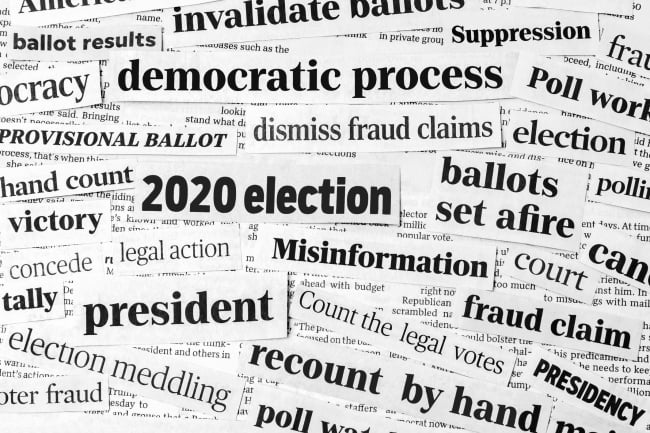You have /5 articles left.
Sign up for a free account or log in.

A federal lawsuit filed last month alleges university disinformation and misinformation researchers colluded with the federal government and social media companies to “censor” Americans’ speech.
Stanford University, a couple of its Internet Observatory leaders and a University of Washington associate professor are sued as defendants.
A co-director of a COVID-19-vaccine skeptics’ group and the founder of the Gateway Pundit conservative website filed the suit together, and they want it to move forward as a class action.
They’re represented by lawyers from, among other firms, America First Legal. Former Trump administration officials, including former senior adviser Stephen Miller, lead this nonprofit, which opposes the “radical left.”
“This case challenges probably the largest mass-surveillance and mass-censorship program in American history—the so-called ‘Election Integrity Partnership’ [EIP] and ‘Virality Project,’” their nearly 90-page complaint begins. “Four entities—Stanford Internet Observatory, University of Washington’s Center for an Informed Public, Graphika and the Atlantic Council’s Digital Forensic Lab—collaborate closely with federal, state and local government officials to monitor and censor disfavored viewpoints on social media.”
“‘Government’ submitted to the EIP ‘tickets,’ i.e., reports of so-called ‘misinformation’ to be censored from the public discourse on social media,” the complaint says. It has similar allegations about the COVID-19–focused Virality Project.
The litigation is atop another case filed last year by the Republican attorneys general of Louisiana and Missouri on behalf of their states, the same two plaintiffs in the new case and others.
The attorneys general sued a litany of federal officials rather than Stanford, the University of Washington or their researchers.
But they nonetheless mention this university collaboration in the over 160-page complaint they filed last month. It’s the third amended complaint in the case.
“The purpose and effect of this consortium of private non-profit groups is to allow federal officials at CISA [the Cybersecurity and Infrastructure Security Agency, of the Department of Homeland Security] and State [Department] to evade First Amendment and other legal restrictions while still operating unlawfully to censor the private election-related speech on Americans on social-media,” that suit says.
“Backed by the authority of the federal government, including DHS, CISA, the State Department, and State’s Global Engagement Center, the consortium successfully sought and procured extensive censorship of core political speech by private citizens: ‘The tickets sought removal, throttling and labeling of content that raised questions about mail-in ballot integrity … and other election integrity issues of concern to conservatives,’” that suit says, quoting at the end from an article in Just the News.
On Thursday night, Stanford made Inside Higher Ed aware of a third federal lawsuit, filed last month in Texas. Stanford and researchers there, but not the University of Washington, are sued in that case.
“Defendants are engaged in egregious violations of the First Amendment across numerous federal agencies—including the White House, the Office of the Surgeon General, the CDC, DHS and CISA—as well as massive government/private joint censorship enterprises, including the Stanford Internet Observatory’s ‘Virality Project,’ to target and suppress speech on the basis of content (i.e., COVID vaccine-related speech) and viewpoint (i.e., speech raising doubt or concern about COVID vaccines’ safety and efficacy and the extent and severity of side effects),” that third suit says.
Dee Mostofi, Stanford’s assistant vice president for external communications, wrote in an email that “We believe the cases are completely without merit and will be vigorously defending them.” A University of Washington spokesman wrote in an email that “Due to ongoing litigation, we aren’t able to speak about the lawsuit.”
On its website, the Stanford Internet Observatory writes that the Election Integrity Partnership and the Virality Project, “both founded in 2020, are non-partisan research coalitions that operate in an open, transparent and public manner, publishing blog posts, weekly updates, briefing videos, academic papers and voluminous investigative reports relating to election and vaccine misinformation, disinformation and propaganda. The EIP’s goal was and continues to be to research and analyze attempts to prevent or deter people from voting, as well as efforts to delegitimize election results.”
Congressional Investigations
In addition to the three lawsuits, the U.S. House Committee on Homeland Security says it “has requested records from the Stanford Internet Observatory and has requested further information from University of Washington personnel.”
Additionally, House Republicans have formed a “Select Subcommittee on the Weaponization of the Federal Government.” It’s part of the House Judiciary Committee, chaired by Jim Jordan, a Republican representative from Ohio.
The committee has requested documents from Clemson University’s Media Forensics Hub, said Darren Linvill, a communication professor who co-directs that hub. Linvill said he also presented to committee staff a few weeks ago, though no Congress members were present.
“That’s really all there is so far,” he said. “We’re hoping that that’s all there will be.”
He said the hub focuses on “digital lies and deception.”
In March, the subcommittee invited Matt Taibbi, a journalist who had been releasing the so-called Twitter files, to testify. The Twitter files, released on that social media platform, have included conversations among Twitter officials regarding working with—and not wanting to continue working with—Clemson.
“Since the Twitter files, we have received several FOIA [Freedom of Information Act] requests,” Linvill said. “Some of them have been quite onerous, and the request we had from Judiciary was very similar.”
Linvill said the committee requested “communications around a set of topics,” but he declined to specify them. He said all the different FOIAs, from journalists but also “independent investigators,” have been “a significant distraction—and, you know, this isn’t what the university pays me to do.”
“I would say that others have been affected far more than us,” he said. “You should talk to folks like Kate Starbird. You know, she has been, in an ongoing way, targeted for harassment, and not just, you know, sort of FOIA requests, but online harassment for some of her work.”
Starbird is an associate professor in the University of Washington’s Department of Human Centered Design and Engineering who also directs that institution’s Center for an Informed Public (CIP). She’s among the defendants in the America First Legal suit and didn’t respond to Inside Higher Ed’s requests for comment.
“One of the key constituent organizations of the Virality Project—the University of Washington and its CIP—is a public state university whose personnel are state employees,” the America First Legal suit says. “Kate Starbird and the other CIP personnel involved in the Election Integrity Partnership and the Virality Project are themselves state government officials who are subject to the U.S. Constitution, as are those acting in concert with them.”
The Washington Post reported earlier this month that Jordan also requested documents from Starbird’s center. A Jordan spokesman didn’t respond to Inside Higher Ed’s requests for comment.
Starbird told The Washington Post that we are “doubling down on the work, but we’re stepping a little bit away from the spotlight, because those tactics work.” She says she’s also stopped using Twitter.
Researchers Defend Their Work
In March, Starbird and other co-founders of the University of Washington’s Center for an Informed Public released a lengthy rebuttal to several “false impressions” they identified about the Election Integrity Partnership.
“At the core of most of the false impressions of our work is a rhetorical argument that seeks to equate efforts to understand and counter false and misleading information with ‘censorship,’” they wrote. “This argument has increasingly been employed against social media moderation efforts—as though these companies do not routinely act to limit spam, pornography, harassment, impersonation and other harmful content on their networks.
“In 2020, some social media platforms put into place ‘civic integrity’ policies to mitigate the spread of false claims about the 2020 election, including content that could disenfranchise voters by confusing them about when or where to vote and content that delegitimized election results. One dimension of the EIP’s work was to alert social media platforms to misleading claims about election processes, discovered in the course of our analysis efforts, that may have violated their policies.”
The Center for an Informed Public co-founders further wrote that the Election Integrity Partnership’s collaboration with the federal Cybersecurity and Infrastructure Security Agency “took place between July 2020 and November 2020,” when “CISA was run by an appointee of President Trump.”
They also wrote that the university’s 2020 participation in the Election Integrity Partnership “was predominantly funded by foundational and philanthropic funding.”
A Starbird National Science Foundation grant did, they wrote, fund university employees who participated “in post-election period analysis of EIP data for the partnership’s final report and for subsequent peer-reviewed publications—and that grant is publicly acknowledged in that work. However, research grants from the U.S. government did not significantly fund nor did U.S. government funding agencies direct or encourage participation by UW [University of Washington] students, staff or faculty in the platform-alerting functions of the EIP.”
As for Stanford, the Stanford Internet Observatory says on its website that it received a grant of roughly $748,000 over five years “to support research into the spread of misinformation on the internet during real-time events. SIO applied for and received the grant after the 2020 election. None of the NSF funds, or any other government funding, was used to study the 2020 election or to support the Virality Project.”
The Cybersecurity and Infrastructure Security Agency said in an email to Inside Higher Ed that “CISA does not and has never censored any speech; any such claims are patently false.”
“With respect to foreign influence operations and disinformation that may impact the integrity of election infrastructure, in response to concerns expressed by election officials of all parties, we are focused on mitigating the risk of disinformation by sharing accurate information and by amplifying the trusted voices of election officials across the nation,” it said. It also said it “did not found, fund or have any role in the management or operations” of the Election Integrity Partnership.




